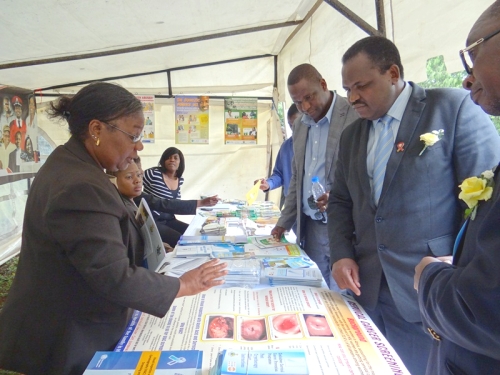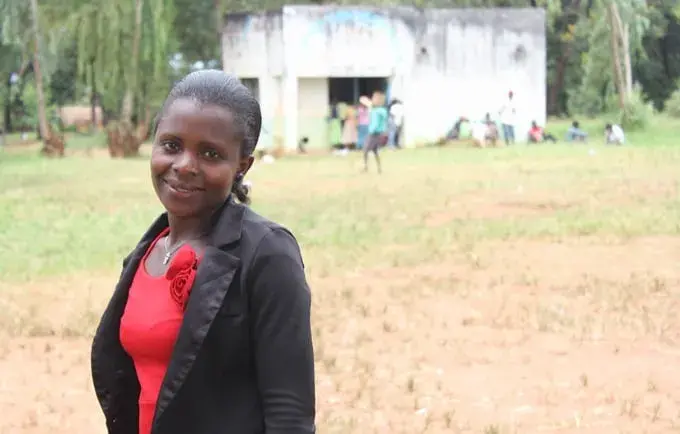HARARE, Zimbabwe, 6 March 2013 — The Minister of Health and Child Welfare, Dr. Henry Madzorera, launched the Integrated Support Programme on Sexual and Reproductive Health and HIV Prevention, more commonly known as the ISP. The four year programme has approximately US$95million in committed resources from the Governments of Britain, Ireland and Sweden.
The programme seeks to support the Ministry of Health and Child Welfare and the Ministry of Women Affairs, Gender and Community Development to provide integrated services in sexual and reproductive health, HIV prevention and gender based violence prevention and response. This is aimed at contributing to the reduction of maternal morbidity and mortality, cervical cancer, gender based violence and HIV.
The programme has four priority areas, namely family planning, cervical cancer, gender based violence and HIV prevention. In his remarks, Dr. Madzorera highlighted that these priority areas are often left out or given little attention during programming and yet they have a negative impact on all our efforts to ensure universal access to sexual and reproductive health and rights. “It is not acceptable for an HIV positive woman doing very well on ART to die prematurely from cervical cancer”, he said. He hailed the ISP and emphasized that it is important to address sexually transmitted infections (STIs), HIV, cervical cancer and gender based violence together to ensure that women get the maximum benefit from the health system.
“Sexual and reproductive health challenges remain a major problem for both women and girls in Zimbabwe leading to negative effects such as unsafe abortions, unplanned pregnancies, increased sexual violations and new STIs and HIV infections”, said the UNFPA Representative, Dr. Basile Tambashe. “These challenges seem insurmountable but together through stronger linkages and integration of services, they can be met, and we can significantly contribute towards improving women’s health and meeting the millennium development goals”, he went on to say.

Dr. Madzorera added that the current indicators for the ISP focus areas are not encouraging; about 1 900 women in Zimbabwe are diagnosed and 1 300 die of cervical cancer every year; 3 in 10 women have suffered from physical violence at some point since the age of 15; HIV still remains the largest cause of death among men and women of reproductive age and children; about 211 000 women who want to avoid or postpone childbearing are not using any method of contraception and a reduction of this number by half could avert an estimated 780 000 unintended pregnancies, 110 500 unsafe abortions and 4 200 maternal deaths. “The ISP is a welcome intervention as it seeks to improve the availability and accessibility of family planning to all women particularly women in rural areas, young women and women living with HIV”, he said.
Besides integrating sexual and reproductive health, HIV and gender based violence services, the ISP brings together different government ministries and parastatals, UN Agencies, donors, non-government organisations and the private sector. “It gives us great pleasure to see such a united front that is aiming at improving the health of Zimbabwe’s poor and vulnerable populations, with a primary focus on women. Zimbabwe needs a healthy and prosperous population to deliver and consolidate development gains”, said the Head of the British Government’s Department for International Development (DFID) in Harare, Ms. Jane Rintoul on behalf of the funding partners, DFID, Irish Aid and Sweden.
In his presentation the Ministry of Health and Child Welfare, Principal Director Preventive Services, Dr. Gibson Mhlanga highlighted that the ISP is going to be implemented along four pillars.
- Pillar 1 focuses on the delivery of innovative social marketing of integrated sexual and reproductive health, HIV and gender based violence services through standalone private sector or NGO run family planning and HIV sites. The Population Services International together with funding from Britain will support the Ministry of Health and Child Welfare to implement this pillar.
- Pillar 2 addresses the public sector integration of family planning, gender based violence, HIV and cervical cancer services. The focus is on expanding demand for these services through community based social and behaviour change promotion and strengthening of the public sector service delivery. The pillar is jointly funded by Governments of Britain, Sweden and Ireland with the funding channeled through UNFPA to support to the Ministry of Health and Child Welfare and the Ministry of Women Affairs, Gender and Community Development to implement this pillar.
- Pillar 3 involves the procurement and nationwide distribution of family planning and HIV commodities to health facilities. This is being implemented by Crown Agents with co-funding from Britain and USAID.
- Pillar 4 involves the carrying out of independent impact evaluations and the provision of technical support and guidance in areas of operations research across all pillars. The World Bank Global AIDS Team is implementing this component with financial support from Britain through DFID.
- 300 000 male circumcisions for both adults and newborns;
- Provide over 2, 2 million Couple Years of Protection helping avert more than 800,000 unintended pregnancies;
- Reach more than 1 million people with behaviour change interventions;
- Deliver HIV testing and counseling to over 400,000 people;
- Provide ARV treatment to 1,200 people living with HIV and AIDS, including 500 sex workers and their children;
- Provide cervical cancer screening for more than 290,000 women and adolescent girls;
- Provide services for 7,000 survivors of sexual assault and rape, and reach more than 1 million people with broad based interventions tackling underlying issues of violence against women and girls. The programme also aims to contribute towards a reduction in the proportion of ‘women who feel their husband is justified in hitting or beating his wife’ (a DHS indicator) from 40% to 25%;
- Support the promotion and distribution of 64 million condoms.
The Minister concluded by calling on all stakeholders to continue working together, integrating programmes and services and intensifying efforts to achieve universal access to sexual and reproductive health. “Together we can ensure that all Zimbabweans attain the highest possible level of health and quality of life” he said.
For more information, please contact:
Donald Mujiri, MOHCW, Tel: +263 712867337, dmujiri@gmail.com
Phylis Munyama, UNFPA, Tel +263 772809611, munyama@unfpa.org
Upenyu Matenga, British Embassy, 04 85855396, Upenyu.Matenga@fco.gov.uk



